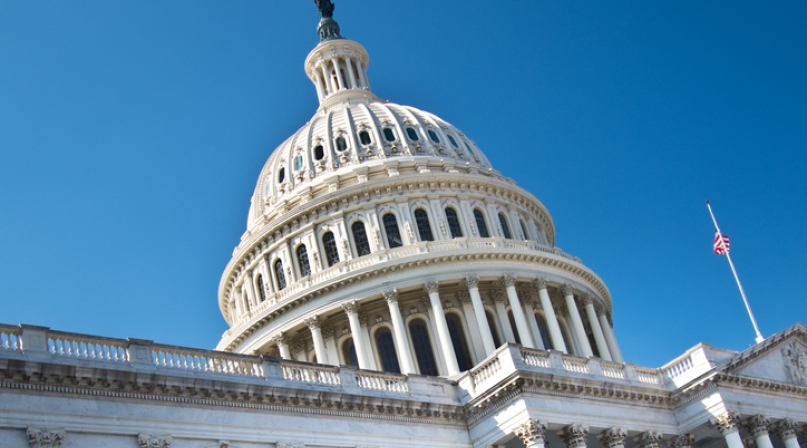U.S. Ways & Means Committee unveils the American Families and Jobs Act Tax Package
Author

Paige Mellerio
Upcoming Events
Related News

Key Takeaways
On June 6, U.S. House Ways & Means Committee Chairman Jason Smith (R-Mo.) unveiled the American Families and Jobs Act, a Committee Republican-led tax package comprised of three separate bills – the Tax Cuts for Working Families Act (H.R. 3936), the Small Business Jobs Act (H.R. 3937) and the Build It in America Act (H.R. 3938). The package is aimed to provide tax relief to individuals and small businesses and establish tax incentives for economic development in rural communities. Of note, the tax package would not extend tax provisions authorized by the 2017 tax reform law, the Tax Cuts and Jobs Act of 2017 (TCJA, PL 115-97), that are set to expire on December 31, 2025.
Of particular note for counties, the American Families and Jobs Act tax package does not include relief from the $10,000 cap on the state and local tax (SALT) deduction or an extension of the Child Tax Credit (CTC) and, if enacted, would roll back several Inflation Reduction Act (IRA) clean energy tax incentives in which counties are eligible for direct payment.
The Ways & Means Committee is anticipated to mark up this package on Tuesday, June 13. Below is a summary of key provisions in the American Families and Jobs Act package.
Tax Cuts for Working Families Act (H.R. 3936)
H.R. 3936 would expand the standard deduction by establishing a new, “guaranteed deduction bonus” for taxpayers making less than $400,000 in adjusted gross income for tax years 2024 and 2025. The standard deduction is a fixed amount individuals can deduct from their taxable income instead of itemizing deductions. The standard deduction was significantly increased by the TCJA, and this new bonus deduction would be in addition to current standard deduction rates. The guaranteed deduction bonus would be $4,000 for joint filers or surviving spouses, $3,000 for heads of household, and $2,000 for individual taxpayers in 2024 and adjusted for inflation in 2025.
However, H.R. 3936 would not provide individual taxpayers relief from double taxation by eliminating the $10,000 cap on the state and local tax (SALT) deduction established by the TCJA. The SALT deduction protected Americans from double taxation and allows state and local governments to maintain authority over local tax structures. Counties urge Congress to not extend the $10,000 SALT cap beyond its December 31, 2025, expiration date and to enact legislation to fully restore the SALT deduction. More information on SALT proposals in the 118th Congress is available here.
Notably, the bill also does not include language to extend changes to the CTC first authorized under the TCJA. Under that law, the value of the CTC—which reduces a household’s tax liability via a partially refundable credit `for each child under age 17—grew from $1,000 to $2,000 per child, with very low-income families able to claim up to $1,400 as a refund even if they do not owe taxes. The TCJA also increased eligibility for the CTC, with households earning up to $400,000 for married filers or $200,000 for single filers eligible for the full credit. Without legislative action, those provisions are set to expire at the end of 2025.
The CTC is one of the most powerful federal anti-poverty tools, and in combination with the Earned Income Tax Credit (EITC), lifts 2.8 million children out of poverty each year. Counties urge our federal partners to expand the CTC, including by making it fully refundable and increasing the size of the credit, to further strengthen its impact on economic security for vulnerable county residents.
Small Business Jobs Act (H.R. 3937)
H.R. 3937 would dramatically increase the 1099 reporting threshold for services performed for individual contractors or subcontractors from $600 to $5,000. The U.S. tax code currently requires businesses and other service-recipients, such as a county, to issue an Internal Revenue Service (IRS) 1099-NEC/MISC Form to report certain payments over $600 annually to independent contractors, subcontractors, or others who are not employees, do not receive benefits and/or do not have federal income tax withheld. Increasing this threshold would significantly reduce administrative burden on entities, such as counties, that regularly contract out services.
H.R.3937 would also establish a new type of opportunity zone, called qualified rural opportunity zones. Unlike the rules governing the qualified opportunity zones, the proposal does not provide for the Governor of a State to submit nominations for qualified rural opportunity zones to the Secretary for certification and designation. Qualified rural opportunity zones are defined as any population census tract if: (i) such census tract is located in a rural county, and (ii) is in persistent poverty (as determined by the Bureau of the Census using the same methodology and data as used in the May 2023 report of such Bureau entitled “Persistent Poverty in Counties and Census Tracts”).
There are two key distinctions that separate the rules for the originally qualified opportunity zones and those of qualified rural opportunity zones. First, unlike the qualified opportunity zone rules, which states that some or all of the deferred gain is recognized on the date on which the qualified opportunity zone investment is disposed or December 31, 2026, whichever is sooner, while the qualified rural opportunity zone rules, extends the disposal date to December 31, 2032.
Second is the difference in the date by which stock, a partnership interest, or property must be acquired to qualify as qualified rural opportunity zone stock, partnership interest or property. Under the original qualified opportunity zone rules, stock, a partnership interest or property is to be obtained at original issuance after December 31, 2017. For the new qualified rural opportunity zone, stock, a partnership interest, and property is required to be obtained after December 31, 2023.
Build It in America Act (H.R. 3938)
The Build it In America Act (H.R. 3938) would repeal or roll back several of the clean energy tax incentives available to county governments under the direct pay mechanism recently established by the Inflation Reduction Act. This direct pay option allows local governments, public utilities and entities such as rural electric cooperatives to pursue economically advantageous renewable energy projects, putting them on a level playing field with the private sector. As such, the direct pay option provides an opportunity for counties to increase access to affordable clean energy, drive investment into rural and underserved communities and reduce emissions in a cost-effective manner.
H.R. 3938 would eliminate the Clean Electricity Production Tax Credit, the Clean Electricity Investment Tax Credit and the Credit for Qualified Commercial Clean Vehicles. Notably, the Clean Electricity Production and Investment Tax Credits do not take effect until 2025 and are intended to serve as a technology-neutral replacement for the current Production and Investment tax credits, which are set to expire at the end of 2024.
Eliminating these credits would remove county governments’ ability to finance much-needed and beneficial clean energy projects, including installing solar, wind and micro-grid facilities and replacing aging county fleets, including police cars, school and transit buses, and garbage trucks, with zero- or low-emission vehicles.
NACo will continue to monitor any developments related to the American Families and Jobs Act.
Attachments
Related News

Counties navigate control of siting, permitting for renewable energy
Local control is at risk where states see the opportunity to take the wheel on siting energy development projects.



